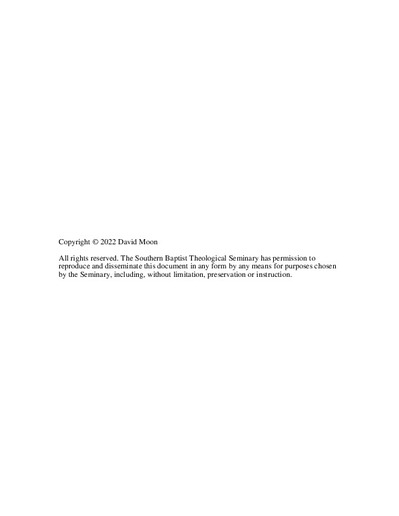Reforming Virtue: Bavinck's Method of Engaging with Virtue Ethics from a Reformed Perspective
Subject
Bavinck, Herman, 1854-1921Christian ethics
Reformed Church--Doctrines
Revelation--Reformed Church
Virtue--Religious aspects--Christianity
Abstract
There is a distinct reluctance in the Reformed tradition to engage with natural theology and scholarship in the study of, among other things, virtue ethics. This thesis attempts to demonstrate that Herman Bavinck’s four pillars of reformed dogmatics allows reformed ethicists to robustly engage in the study of virtue ethics. In chapter 1, I describe the nature and impact of the widening philosophical rift between specific and general revelation in the Reformed camp which can be traced to nineteenth-century Barthian dialectics, Van Tillian presuppositionalism, and Neo-Calvinism which served to bifurcate, and not integrate, general and special revelation. As a result, ethicists are discouraged from the use of evidences, natural theology, and secular scholarship (i.e., Aristotelian-Eudaimonist virtue) in constructing a Biblical system of ethics. In chapter 2, I demonstrate how Herman Bavinck utilized a reformed framework of theology and ethics to robustly engage with the culture, politics, and science of his day. Chapter 3 analyzes the first of four pillars of Herman Bavinck’s ethical thought, namely Bavinck’s doctrine of Revelation, to demonstrate the classical reformed understanding of special and general revelation. Chapter 4 examines Bavinck’s Biblical anthropology to show prescribed ethical outlooks based upon a tiered understanding of humanity’s condition. Chapter 5 looks to Bavinck’s doctrine of Imitatio Incarnatus Christi to argue that the imitation of Christ bridges mystical and practical ethics. Chapter 6 addresses the last of the four pillars—the Kingdom of God—as a converging ethical paradigm. In chapter 7, I conclude by discussing the ramifications of applying Bavinck’s four pillars to the study of ethics for the purpose of encouraging ethicists to rigorously pursue the study of virtue not despite, but due to their Reformed heritage.

